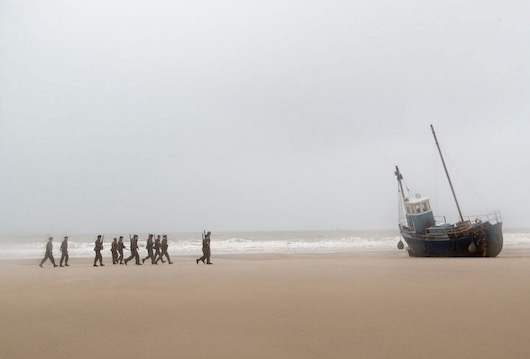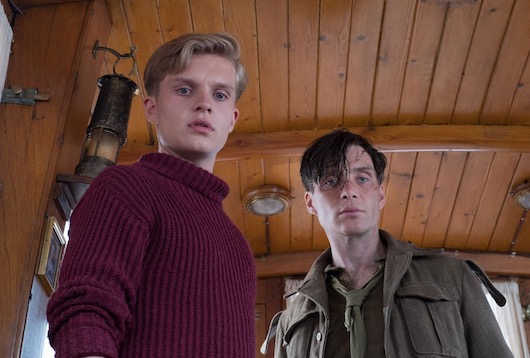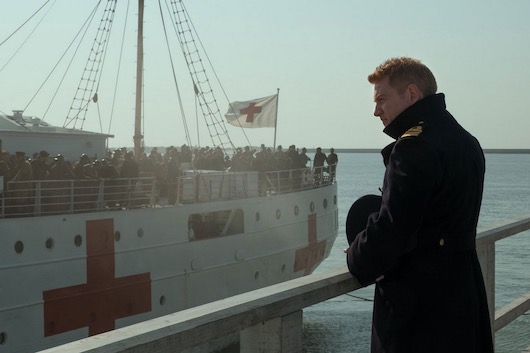 FILM
FILM « In Which We Really Want To Return To England »
 Monday, July 24, 2017 at 8:51AM
Monday, July 24, 2017 at 8:51AM 
War of the Ancients
by ALEX CARNEVALE
Dunkirk
dir. Christopher Nolan
106 minutes
 Bane (Tom Hardy) is an English fighter pilot during World War II. After a sound thrashing, British and French troops decide to flee back to England instead of mounting a final stand. In contemporary British military history, this is the biggest win Christopher Nolan (The Prestige) has on hand to glorify. Just wait until he finds out about Admiral Nelson.
Bane (Tom Hardy) is an English fighter pilot during World War II. After a sound thrashing, British and French troops decide to flee back to England instead of mounting a final stand. In contemporary British military history, this is the biggest win Christopher Nolan (The Prestige) has on hand to glorify. Just wait until he finds out about Admiral Nelson.
Nolan's last decent movie was 2010's Inception, although watching it back is something of a chore, especially the last hour. Nolan took Batman very seriously, perhaps even more seriously than Bruce Wayne himself did, but those movies are tough to watch now, too. 2014's Interstellar was an amusing mess, but it posed more questions than it answered. For example, what sort of actor does Nolan work well with other than Tom Hardy? Is it really necessary for Mr. Nolan to keep making movies that barely have women in them? And why does Tom Hardy do the Bane voice in the loud torrent of moviegoing experience that is Dunkirk?

Dunkirk is supposed to be thrilling, if a bit exhausting to experience. Sitting through it feels substantially longer than the stated running time. The first thing it made me think of is the bravura sequence that opens Alejandro Iñárritu's The Revenant, where we are thrust in the naturalistic midst of a battle. At times, when Nolan gives Dunkirk over to some of that inspired chaos, we feel that same sense of immersion. War seems a terrible, random tragedy.

This is a fleeting sensation, however, since Nolan is compelled to give us some semblance of a glimpse, but only that, into the mindset of these men. Their main driving emotion, across the board, is complete and utter fear. The only really determined member of the cast is Dawson (a particularly intolerable and affected Mark Rylance), a civilian slowly traipsing over to France in order to ferry soldiers back to the only island they know.
Substantially more charismatic is a British private played by newcomer Fionn Whitehead, who is only intent on getting off the dangerous beach, where 400,000 could have been crushed by Adolf Hitler's slightest impulse. Meanwhile Bane flies a plane intent on providing cover for the evacuation. Tom Hardy does more acting with his eyes during these gorgeous sequences of flight than others do with their entire body.
Nolan's trademark has always been total control of the action and cinematography of his projects, but he works against that tendency in Dunkirk. The issue is that if he turned something necessarily chaotic and random into a smooth interplay of unlike elements, he would be sacrificing the integrity of this recreation. As a result, Dunkirk only intermittedly coheres into moments of pure beauty.

This is not to say that Dunkirk is completely naturalistic. Violence is naturally condemned by not identifying the perpetrators or their motives, since it denies us the chance to empathize with the opposing force. Near the end of Dunkirk, we view a few Nazis for a only moment – just as quickly they are gone. I am not completely sure whether their exclusion is a weird sort of pardon, since the reason Hitler did not slaughter the English at Dunkirk was probably because his closest female friend was from that great country.
The best part of Dunkirk is the time dilation that Nolan thankfully does not overly explain. It means that the narrative jumps around in its chronology, and since there is not a whole lot of caring about the actual characters involved in this escape or a focus on the significance of their deaths, the only thing to do as a viewer is figure out why exactly Nolan opted for this approach. Given time, I couldn't think of a reason other than to make war more compelling through inception.

I saw Dunkirk in 70mm IMAX. The sound was completely overdone — there is such thing as overwhelming the senses, and another thing where you completely decimate the long-term hearing of your audience. Visually, if you compare it to films of ten years ago, Dunkirk looks substantially more lavish than all of them in its loud and oversized playpen. But if you compare it to, say, the preview of Justice League, it appears rather restrained and muted. Christopher Nolan continues to awkwardly straddle the line between action blockbuster and art film. I wish to God he would simply pick one of the two.
Alex Carnevale is the editor of This Recording.































Reader Comments